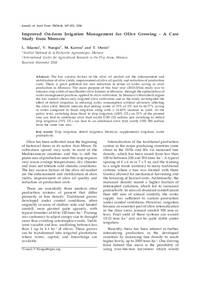Improved On-farm Irrigation Management for Olive Growing - A Case Study from Morocco

Authors:
The key success factors of the olive oil market are the enhancement and stabilization of olive yields, improvement of olive oil quality and reduction of production costs. There is great potential for cost reduction in terms of water saving in olive production in Morocco. The main purpose of this four year (2010-2014) study was to enhance crop yields of smallholder olive farmers in Morocco, through the optimization of water management practices applied to olive cultivation. In Morocco’s Marrakech region the low rainfall allows only irrigated olive cultivation and so the study investigated the effect of deficit irrigation in reducing water consumption without adversely affecting the olive yield. Results indicate that adding water at 70% of ETc led to 63-77% saving in water compared to flood irrigation along with a 13-43% increase in yield. At the policy level, switching from flood to drip irrigation (100% ETc) on 25% of the planted area can lead to additional olive fruit worth USD 213 million and switching to deficit drip irrigation (70% ETc) can lead to an additional olive fruit worth USD 390 million from the same size area.
